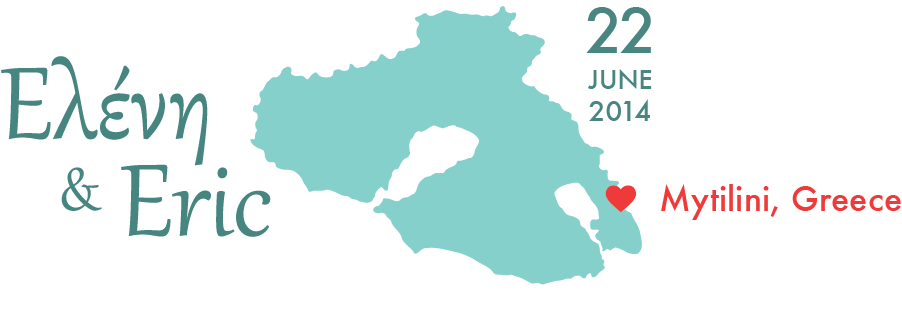Things to do
On Lesvos
Lesvos is the third largest island in Greece, and although it attracts some tourists, the economy here is more reliant on other more traditional industries: olive oil, fishing, and ouzo. The island has been inhabited since ancient times, so there is history from ancient Greece and Rome through the Byzantine and Ottoman empires. Lesvos was a major cultural center in ancient Greece, and it was fought over by Athenians, Spartans, and Trojans. The Ottomans called it “the garden of the Aegean.”
Whether you want to relax on the beach, explore the natural environment, or visit cultural sites, there’s a little bit of everything. There is plenty to see and do to fill a week, even if you didn't have a wedding to attend. Since most guidebooks only give Lesvos a page or two, we’ve put together a list of our favorite places on the island (See the pages for Mytiliini/East, South, North, and West). You can also find information about travel around Lesvos at www.lesvosgreece.gr/en. The map below shows the lay of the land.
View Larger Map
Elsewhere in Greece
We encourage you to stick around and explore Lesvos. But, if you want to more information about traveling in Greece, www.visitgreece.gr is an excellent website with much more information than we could ever compile ourselves to help you plan your trip to Lesvos and other parts of the country.
Don't forget to see the Acropolis when you stop over in Athens, and the new Acropolis Museum has an excellent and well-organized display of artifacts and history of ancient Greece. If you are interested in hiring a personal guide to the Acropolis or elsewhere around Athens, we highly recommend our friend Natalia Sideri (bluejasmin1@yahoo.gr), who is a licensed tourist guide.
General Information
Cash and Tipping
Greece works on cash. Hotels will certainly accept credit cards, some stores and restaurants well as well, but for beaches, cafes, taxis, and other day-to-day expenses you will need to carry cash. Fortunately, most prices are reasonable, so you shouldn't need to tote a fortune. We have found that the easiest way to get Euros is just to withdraw them from the ATM with a debit card, but make sure you call your bank to let them know that you are traveling. Tips are not expected anywhere in Greece. You may leave some change up to a euro or two when you pay your bill for a meal, but more is not necessary and taxi drivers will not expect anything.
Store Hours
Stores are open Monday through Saturday in the morning until 2pm and Tuesdays, Thursdays, and Fridays in the afternoon usually 5-8pm. These hours hold for pharmacies and gas stations. However, there is always one of each open in Mytilini to serve emergencies. Tourist shops are often open through the whole day and on weekends.
Local Products
Lesvos is well known throughout Greece for producing top quality ouzo as well as good olive oil, cheeses, and sardines. Unlike many other islands that rely almost entirely on tourism, agriculture and fishing still make up a major part of Lesvos' economy. Local products can be purchased at Aiolia Earth/Αιόλια Γη on the port, at many shops in Mytlini's market (Ermou/Ερμού), and in towns around the island such as Molivos and Eressos.
- Olive Oil
- Ouzo
- Cheese: Graviera, Ladotyri, Feta
- Sardines
- Fruits in Syrup
Beaches
It’s not really summer in Greece unless you go to the beach. Being an island, you’re never far from one in Lesvos. We’ve listed and mapped a few of our favorites if you want some recommendations. The beach chairs and umbrellas are often free to use on the island, first-come-first-served, but you’re expected to spend a few euros on a drink or a snack when the server comes around. They can let you know if there is an additional charge for umbrellas, although prices are usually posted. The water is generally very safe for swimming, especially where you see established beach facilities. If you want to take a dip along rockier parts of the shore, keep an eye out for sea urchins.
Coffee
Everybody is drinking coffee whether at home, at the cafe, or on the beach. Coffee isn't just a drink, it's a social occasion. It doesn't hurt to learn how to order so you can enjoy it too. There are four basic ways coffee is prepared:
- Greek Coffee (elliniko cafe/ελληνικό καφέ) is a small cup made from finely ground coffee, always served hot. You may know it as "Turkish Coffee."
- Frappe/Φραπέ is a cold coffee drink made from Nescafe instant coffee. Eric is not usually a fan of instant coffee, but this is nice cool drink for the beach. You must specify how much sugar (see below) and if you want it with milk (me gala/με γάλα)
- Espresso and Cappuccino are what you would expect. If you want it iced, order "Freddo Espresso" or "Freddo Cappuccino." Also say how much sugar you want.
- French (galliko cafe/γαλλικό καφέ) is the usual filtered coffee you think of drinking with breakfast. This is actually the hardest to find. Most cafes and restaurants will serve it, but at the beach it will be easier to get espresso.
To specify how much sugar you want, you basically have three choices:
- sketo/σκέτο is without any sugar
- metrioμέτριο is with a moderate amount of sugar
- glyko/γλυκό is sweet
Afternoon Nap
Spaniards aren't the only Mediterraneans who enjoy a siesta. Greeks typically take their nap in the mid afternoon following a large lunch. It's too hot outside to do much else, and besides you'll need to charge up so you can party late into the night! You can certainly use this time to go to the beach or look around, but many stores close in the mid to late afternoon and reopen in the evening, and you will find many of the villages pretty quiet in the hours from 2 to 5pm.
